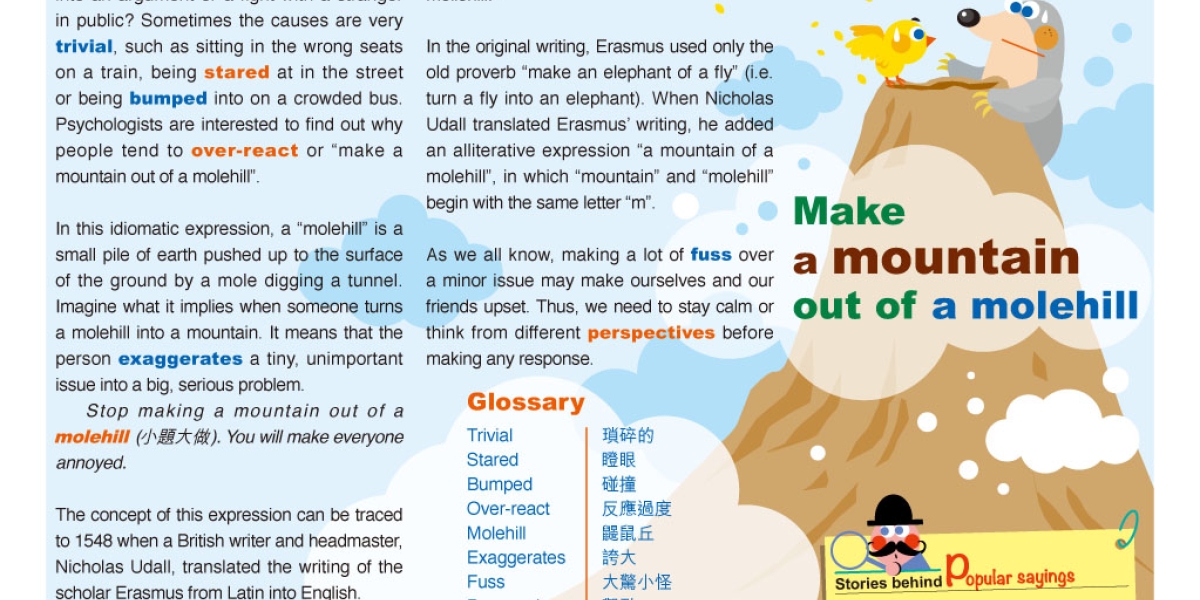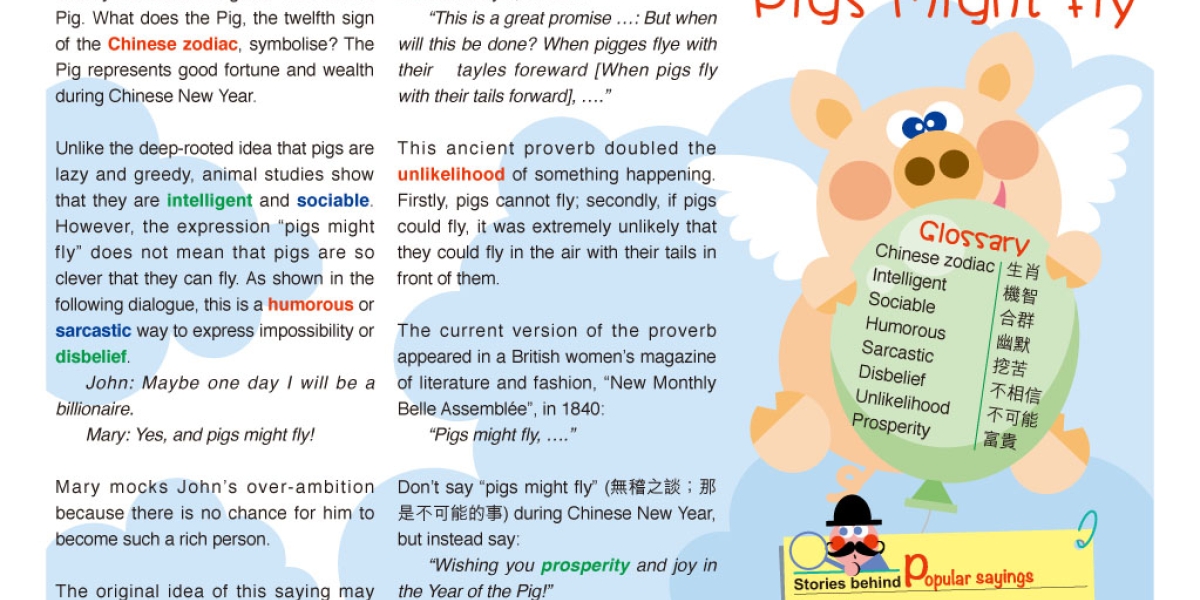昔日文章


Stories Behind Popular Sayings
2019.02.22
Make a mountain out of a molehill
Have you ever wondered why people get into an argument or a fight with a stranger in public? Sometimes the causes are very trivial, such as sitting in the wrong seats on a train, being stared at in the street or being bumped into on a crowded bus. Psychologists are interested to find out why people tend to over-react or “make a mountain out of a molehill”.
In this idiomatic expression, a “molehill” is a small pile of earth pushed up to the surface of the ground by a mole digging a tunnel. Imagine what it implies when someone turns a molehill into a mountain. It means that the person exaggerates a tiny, unimportant issue into a big, serious problem.
Stop making a mountain out of a molehill (小題大做). You will make everyone annoyed.
The concept of this expression can be traced to 1548 when a British writer and headmaster, Nicholas Udall, translated the writing of the scholar Erasmus from Latin into English.
“The Sophistes of Grece coulde … make an Elephant of a flye, and a mountaine of a mollehill.”
In the original writing, Erasmus used only the old proverb “make an elephant of a fly” (i.e. turn a fly into an elephant). When Nicholas Udall translated Erasmus’ writing, he added an alliterative expression “a mountain of a molehill”, in which “mountain” and “molehill” begin with the same letter “m”.
As we all know, making a lot of fuss over a minor issue may make ourselves and our friends upset. Thus, we need to stay calm or think from different perspectives before making any response.
Glossary
Trivial
瑣碎的
Stared
瞪眼
Bumped
碰撞
Over-react
反應過度
Molehill
鼴鼠丘
Exaggerates
誇大
Fuss
大驚小怪
Perspectives
觀點


Stories Behind Popular Sayings
2019.02.15
A Rough Diamond
In 2017, the Lesedi la Rona, the largest rough diamond found in more than a century, was sold for US$53 million to a London jewellery company. After a year of analysis, the company has turned the rough gemstone into at least sixty smaller valuable diamonds.
When a newly-discovered diamond is in its natural state, it is called “a rough diamond”. This expression can be used metaphorically to describe a person.
Polly is a rough diamond(有潛質而未經琢磨的人). If you give her good training, she will become a capable actress.
Just like an unrefined stone that will become a sparkling jewel after being professionally cut and polished, Polly has some good potential or characteristics that are hidden and not well developed.
This idiomatic expression also refers to someone who has a good character at heart but is impolite and uncultivated.
Peter always looks untidy, but he is a rough diamond (外粗內秀的人).
The figurative meaning was used as early as 1624 in a tragicomedy “A Wife for a Month” written by the British playwright, John Fletcher.
“She is very honest, and will be as hard to cut as a rough diamond.”
An alternative form of this saying is “a diamond in the rough”. Similarly, its basic meaning is that the diamond is in an imperfect or unfinished state before the craftsman does his work.
Give this candidate a chance. I think he is a diamond in the rough.
In reality, a lot of people are like rough diamonds or diamonds in the rough. So do not simply look at their appearances.
Glossary
Rough
未琢磨的
Gemstone
寶石
Unrefined
未提煉的
Sparkling
閃亮的
Uncultivated
沒有教養的
Figurative
比喻的
Tragicomedy
悲喜劇
Craftsman
工匠


Stories Behind Popular Sayings
2019.01.25
Pigs might fly
Chinese people around the world will shortly be celebrating the Year of the Pig. What does the Pig, the twelfth sign of the Chinese zodiac, symbolise? The Pig represents good fortune and wealth during Chinese New Year.
Unlike the deep-rooted idea that pigs are lazy and greedy, animal studies show that they are intelligent and sociable. However, the expression “pigs might fly” does not mean that pigs are so clever that they can fly. As shown in the following dialogue, this is a humorous or sarcastic way to express impossibility or disbelief.
John: Maybe one day I will be a billionaire.
Mary: Yes, and pigs might fly!
Mary mocks John’s over-ambition because there is no chance for him to become such a rich person.
The original idea of this saying may come from the writing of Walter Haddon, a British lawyer, in 1581.
“This is a great promise …: But when will this be done? When pigges flye with their tayles foreward [When pigs fly with their tails forward], ….”
This ancient proverb doubled the unlikelihood of something happening. Firstly, pigs cannot fly; secondly, if pigs could fly, it was extremely unlikely that they could fly in the air with their tails in front of them.
The current version of the proverb appeared in a British women’s magazine of literature and fashion, “New Monthly Belle Assemblée”, in 1840:
“Pigs might fly, ….”
Don’t say “pigs might fly” (無稽之談;那是不可能的事) during Chinese New Year, but instead say:
“Wishing you prosperity and joy in the Year of the Pig!”
Glossary
Chinese zodiac
生肖
Intelligent
機智
Sociable
合群
Humorous
幽默
Sarcastic
挖苦
Disbelief
不相信
Unlikelihood
不可能
Prosperity
富貴


Stories Behind Popular Sayings
2019.01.18
Spick and span
You might already have felt the strong festive atmosphere of Chinese New Year, which is approaching in about two weeks’ time. During this preparation time, sweeping the house is a must-do traditional activity for Chinese families. The cleaning is meant to sweep away all the bad luck experienced in the previous year so as to have an auspicious start for the new year. Thus, every house is kept “spick and span” – spotlessly clean and tidy.
The idiom “spick and span” originally appeared as “spick and span new” in Thomas North’s English translation of the biographies written by the Greek essayist, Plutarch, in 1579. It meant “ brand-new ” only during that time.
“They were all in goodly gilt armours, …, spicke, and spanne newe.”
Some scholars think that the long version may come from an old Dutch word “spikspeldernieuw”, which literally means “as new as a spike from the fire and a chip from a wood block”.
The modern version was first used in the diaries written by a British naval administrator in 1665.
“My Lady Batten walking through the dirty lane with new spick-and-span ( 整潔的) white shoes.”
The alliteration (i.e. both “spick” and “span” begin with the same consonant sound) phrase has changed to the modern meaning for something which is so clean that it looks entirely new.
In early 20th century, the saying was modified by a manufacturer of household products as a major trademark of cleaners in the USA.
Spic and Span® Multi-Surface Cleaner
Although the spelling of “spick” with “k” was altered to “spic”, the pronunciation remained unchanged.
Glossary
Auspicious
吉祥的
Spotlessly clean
一塵不染
Brand-new
嶄新的
Spike
尖鐵
Chip
薄木片
Alliteration
頭韻
Manufacturer
製造商
Trademark
商標


